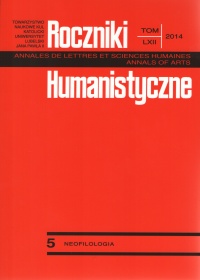Two Thematic Dictionaries Viewed from Near: Words Belong to a Culture
Abstract
The main purpose of this paper is to draw attention to several issues related to the lexicography of bilingual thematic dictionaries. It seems to us, as to Stark (2011), the author of the book Biingual Thematic Dictonaries, that this kind of dictionaries has not yet been sufficiently described. Therefore, at the beginning of this article, arises the question what exactly is a bilingual thematic dictionary (BTD), and arguments are presented to prove that a BTD is an interesting subject of study. Then, we briefly discuss the macrostructure of a BTD and some reflections on the linguistic picture of the world in the dictionary are presented. The reference point for these reflections is a brief comparison of two thematic dictionaries: the Ukrainian-Polish and Ukrainian-Spanish issued by Vadim Karcenko Publisher from Kiev in 2008 and 2012. A series of short examples of the solutions used in the two dictionaries is shown in order to point out the need to further description of the structure of the DSTs and to stress that composing this kind of dictionary is a complex process that is not only challenging from the lexicographical point of view, but it is an interdisciplinary complex task, requiring consideration of various culturological and semasiological researches.
References
Apresjan, J. (1994). “Naiwny obraz świata w leksykografii”. Etnolingwistyka, no 16, p. 5–12.
Dubois, J. et C.(1971). Introduction à la lexicographie. Le dictionnaire. Paris: Larousse.
Forgas Berdet E. (2001). Diccionario e ideología: tres décadas de la sociedad espańola a través de los ejemplos lexicográficos. En línea: http://www.ub.edu/filhis/culturele/forgas.html (último acceso: 9.11.2013).
Haensch, G. (1997). Los diccionarios del español en el umbral del s. XXI. Salamanca: Ediciones Universidad de Salamanca.
Jaskot, M. (2013). Los así llamados falsos amigos del traductor entre el español y el esperanto. Tesis doctoral en posesión del autor.
Luque Nadal, L. (2008). Los diccionarios lingüístico culturales y el estudio de fraseologismos. En línea: https://www.google.pl/url?sa=t&rct=j&q=&esrc=s&source=web&cd=2&ved=0CDQQFjAB&url=http%3A%2F%2Fwww.sagw.ch%2Fdms%2Fsseh%2Fpublications%2 Funtitled%2Funtitled10%2F01-Luque&ei=ev99UoP-OvON7AagxYDABg&usg=AFQjCNF1MPkcUKTaFd7VymZpUx0ivARWNw&sig2=vCDLa7kfShgei0yrUtt2bQ&bvm= bv.56146854,d.ZGU (último acceso: 9.11.2013).
Piotrowski, T. (1994). Z zagadnień leksykografii. Warszawa: Wydawnictwo Naukowe PWN.
Snell-Hornby, M. (1986). The Bilingual Dictionary — Victim of its Own Tradition? Dublin: Hartmann.
Stark, M. (2011). Bilingual Thematic Dictionaries. Berlin, Boston: De Gruyter.
Vidiella M. (2012). El enfoque léxico en los manuales de ELE. En línea: http://marcoele.com/ descargas/14/vidiella-lexico.pdf (último acceso: 9.11.2013).
Copyright (c) 2014 Roczniki Humanistyczne

This work is licensed under a Creative Commons Attribution-NonCommercial-NoDerivatives 4.0 International License.





